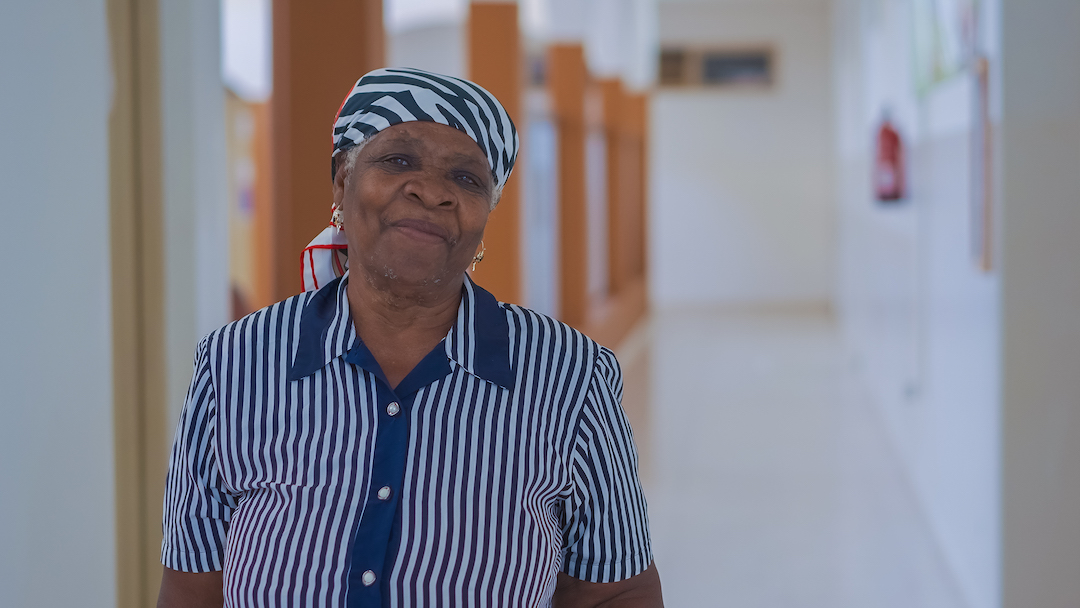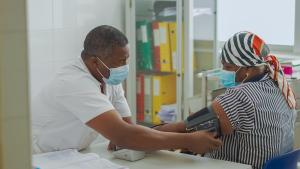Tackling chronic diseases
Praia – Teresa Ramos de Carvalho’s long struggle with hypertension and diabetes has turned around since she began attending regular consultations and receiving her medication free of charge at her local health facility in São Domingos in the central area of Cabo Verde.
She is resuming normal life again after being forced to spend a month in hospital last year to stabilize her medications, benefiting significantly from the country’s committed efforts to tackle cardiovascular diseases, which are among Cabo Verde’s main causes of death and disease.
“I am pleased with the service I receive here.” Teresa Ramos de Carvalho
According a Ministry of Health Statistical Report, noncommunicable diseases (NCDs) are responsible for 70% of all deaths in the country, with more than one-third of those due to cardiovascular diseases, and around 5% to diabetes. Cardiovascular diseases affect just less than 170 out of every 100 000 people, with women at slightly higher risk.
With World Health Organization (WHO)’s support, Cabo Verde’s Ministry of Health is training healthcare professionals in the basic protocols of the WHO’s Package of Essential NCD interventions (WHOPEN), starting in 2019 with a pilot programme at three primary health care centres to address the diseases and their risk factors.
The training of 16 doctors, nurses, and social workers has since cascaded, with WHO technical and financial support, to implement the protocol at more than half of all the country’s 22 primary health care facilities. With at least 23 doctors now trained to assess cardiovascular risk and prescribe medications for secondary prevention, the initiative is having a direct impact on 1500 patients, while indirectly benefiting nearly 285 000 others.
“Together, with good awareness-raising, good education and the promotion of healthy habits, we will ensure that we are in a position to curb chronic diseases…” Filomena Mendes Gonçalves, Minister of Health
“Through this strategy of training the doctors who are specialists in general and family medicine, we are working to ensure that every municipality has a focal point doctor for the WHOPEN protocols, taking responsibility for the ongoing training of health professionals,” says Dr Flavia Semedo, the Emergency Health Officer for WHO Cabo Verde.
Currently, all patients visiting health centres at which these trained doctors work undergo cardiovascular risk assessment, using the WHO cardiovascular risk charts for the West Sub-Saharan Africa region. The tool has been invaluable in overcoming the absence of laboratory tests, especially in rural areas.
In addition, patients receive information about the benefits of reducing cardiovascular risk factors, especially through healthy lifestyle habits.

Cabo Verde has invested heavily in expanding primary health care services in recent years, according to Minister of Health, Filomena Mendes Gonçalves. Significant investments were made in a variety of areas, including infrastructure, diagnostic capacity and state-of-the-art equipment, among others.
“Together, with good awareness-raising, good education and the promotion of healthy habits, we will ensure that we are in a position to curb chronic diseases, especially hypertension,” she says. “We must continue to invest in human resources, to ensure that in all our structures in our country, we have the capacity to provide the best care for the people.”
As for Ramos de Carvalho, she is so happy with the service that she receives where she lives that she has rejected her daughter’s suggestion to move closer to her in the island’s capital, Praia. “I refused,” she says. “I am pleased with the service I receive here.”
WHO Cabo Verde
Email: nlima [at] who.int (nlima[at]who[dot]int)
Mobile: +238 9700002
Media Relations Officer
WHO Regional Office for Africa
Email: dalalm [at] who.int (dalalm[at]who[dot]int)
Tel: +254 703 245 761 (WhatsApp)



